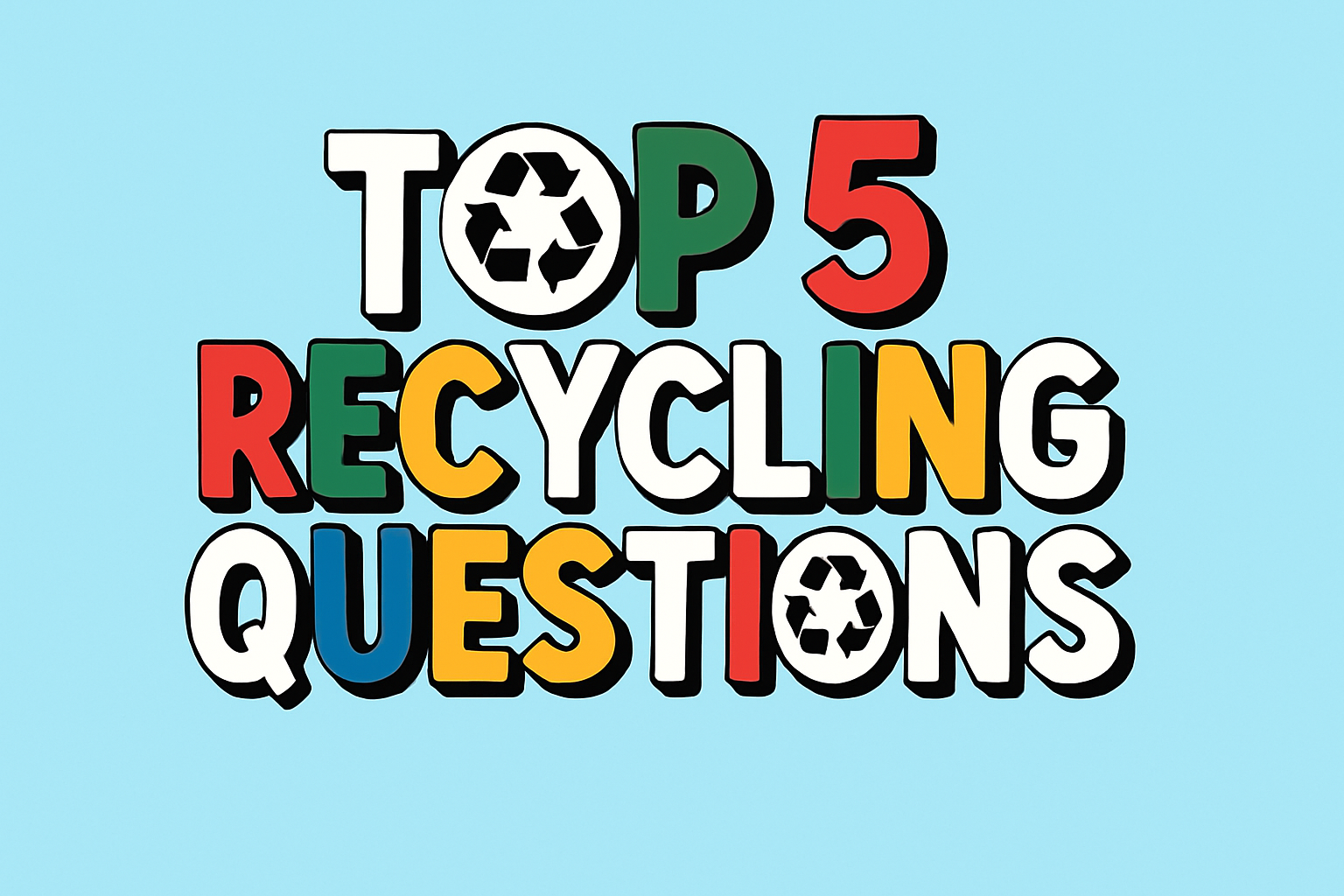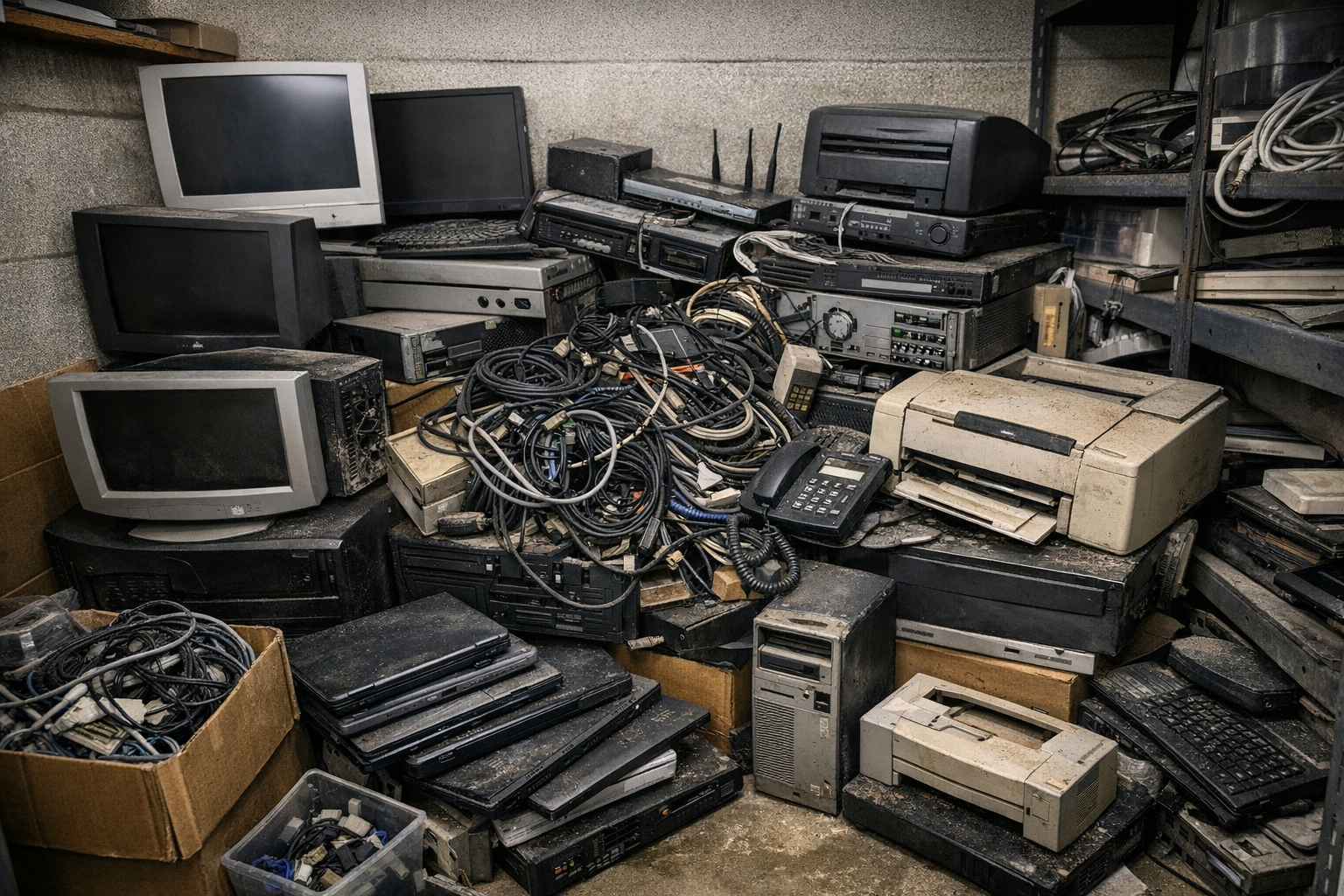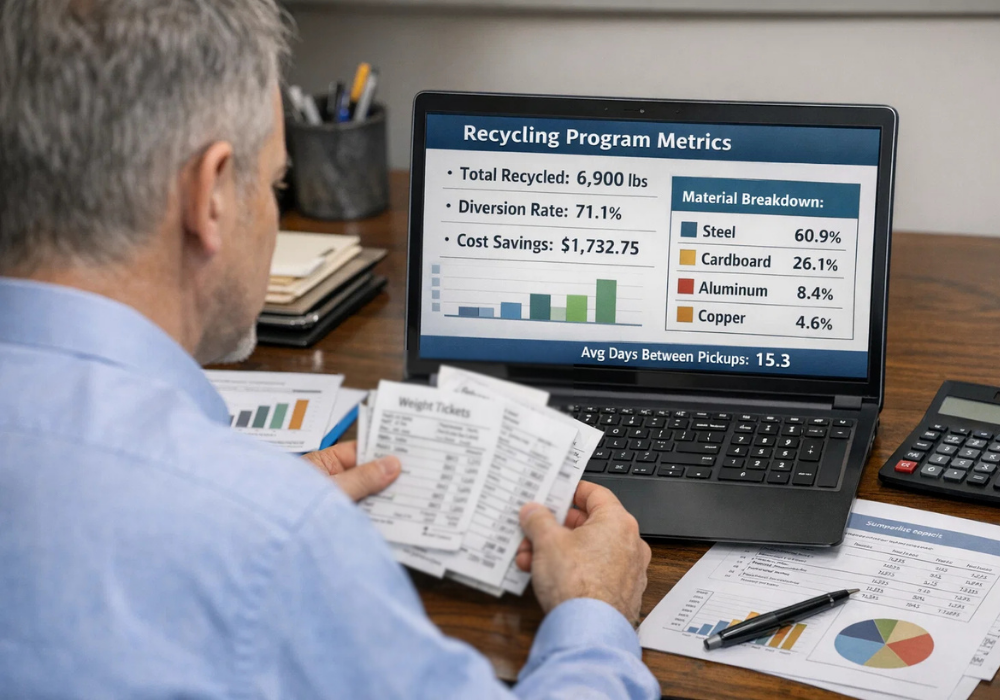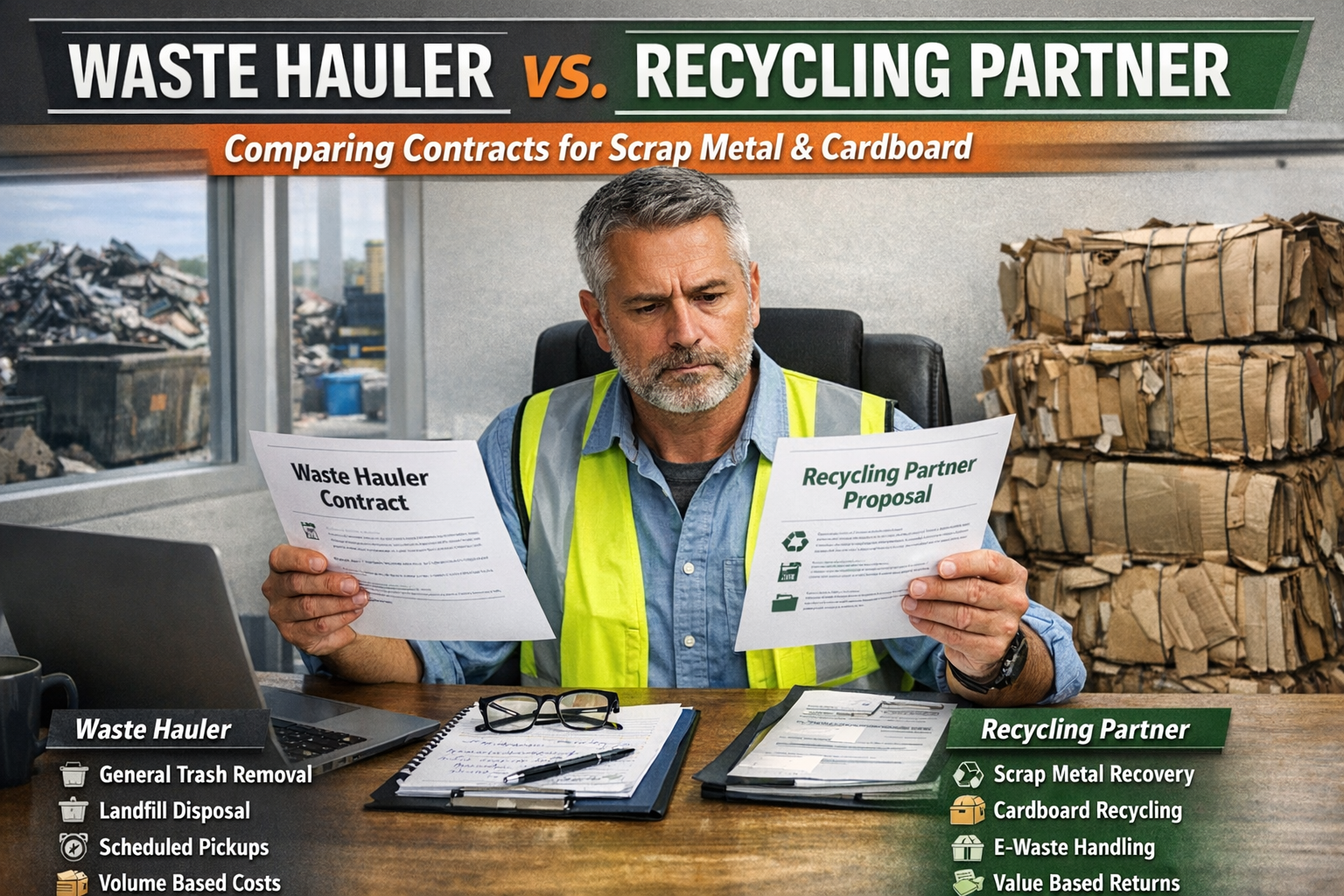Featured Snippet
The top recycling FAQ for businesses covers: identifying valuable materials like copper and cardboard that generate rebates, understanding fair scrap pricing, sorting requirements, optimal pickup scheduling, and the recycling journey after collection. Professional recyclers handle most sorting, recommend monthly pickups for average businesses, and ensure materials reach certified processing facilities for genuine recycling.
Video Summary:
Introduction: Top 5 Questions for Business Recycling Services California
Running a business in California means juggling countless responsibilities—and figuring out your recycling program shouldn't add unnecessary stress. After serving Northern California businesses for nearly a decade and recycling over 70 tons of metal in 2024 alone, we've heard every recycling question imaginable.
Today, we're answering the five questions business owners ask most often. These aren't theoretical answers—they're practical insights from the field, backed by real experience helping everyone from Sacramento electricians to Central Valley construction managers maximize their recycling programs.
Question 1: "What Items in My Business Waste Stream Are Actually Worth Money?"
This might surprise you: several materials your business tosses could be generating revenue instead of disposal fees.
Materials That Pay You Back:
The metals hiding in your facility are the obvious gold mine. Copper wiring from electrical work commands top dollar—especially clean, bright copper without insulation. Aluminum from old HVAC units, window frames, and even beverage containers adds up quickly. Brass fixtures and fittings from plumbing renovations have significant value. And don't overlook steel—while it pays less per pound than copper or aluminum, the sheer volume from construction projects or equipment disposal makes it worthwhile.
But here's what many businesses miss: cardboard bales. If you're generating consistent volumes of clean, dry cardboard, you're sitting on a rebate opportunity. We've worked with fast-food franchises and retail locations that turned their cardboard waste from a disposal cost into a revenue stream.
The Hidden Value in Equipment:
Old HVAC units deserve special mention. These contain multiple valuable metals—copper coils, aluminum fins, and steel frames. One medical facility we serviced recovered enough value from their old cooling units to offset a portion of their equipment upgrade costs.
Even car batteries from fleet vehicles have recycling value due to their lead content and recyclable plastic casings.
Question 2: "How Do I Know I'm Getting a Fair Price for Scrap?"
Transparency matters, and you have every right to understand your scrap's value.
Understanding Market Rates:
Scrap metal prices fluctuate based on global commodity markets. Copper might range from $3-4 per pound one month and shift 20% the next. The key is knowing where to check current rates. Websites like ScrapMonster and iScrap App provide daily pricing updates for your region.
What Affects Your Price:
Several factors influence what you'll receive:
- Material grade: Clean, sorted materials command higher prices than mixed loads
- Volume: Larger quantities often qualify for better rates
- Preparation: Stripped copper wire pays more than insulated wire
- Market timing: Prices shift weekly based on demand
Red Flags to Avoid:
Watch out for recyclers who won't explain their pricing or provide weight tickets. Legitimate operations provide clear documentation showing exact weights and rates. Any recycler refusing to let you watch the weighing process should raise concerns.
A fair recycler will also explain deductions. For instance, if your aluminum has steel attachments, they'll show you how that affects the price rather than just offering a lowball number.
Question 3: "Do I Need to Sort Materials or Will the Recycler Handle It?"
The short answer: basic sorting pays off, but we're more flexible than you might think.
Sorting That Makes Sense:
You don't need a degree in metallurgy, but simple separation boosts your return:
- Keep copper separate from aluminum
- Separate clean metals from painted or coated materials
- Remove obvious non-metal attachments when easy
- Keep ferrous (magnetic) and non-ferrous metals apart
For a construction site we service regularly, this means having separate bins for copper wire, aluminum siding, and steel beams. Takes minimal effort but maximizes value.
When We Handle the Heavy Lifting:
However, if sorting seems overwhelming, professional recyclers can manage mixed loads. We've serviced hospitals removing 125 medical beds in under 72 hours—there wasn't time for detailed sorting, and that's fine. The value might be slightly less for mixed materials, but the convenience often outweighs the difference.
Electronics and HVAC units? Leave those intact. We're equipped to safely dismantle complex equipment and extract maximum value from each component.
Question 4: "How Often Should I Schedule Pickups?"
Pickup frequency depends entirely on your business type and volume.
Volume-Based Guidelines:
For electricians and plumbers, monthly pickups usually work well. You're generating consistent amounts of copper and brass that justify regular service without cluttering your workspace.
Construction sites need more flexibility. During demolition phases, you might need weekly or even daily service. During slower periods, bi-weekly might suffice. The key is having a recycler who can scale with your needs.
Healthcare facilities and hotels often benefit from quarterly schedules for equipment disposal, with more frequent pickups if renovating.
Signs You Need More Frequent Service:
- Materials overflowing designated storage areas
- Safety concerns from accumulated materials
- Valuable materials exposed to weather (reducing their value)
- Local ordinances requiring timely disposal
The Sweet Spot:
Most businesses find that scheduling regular pickups—even if volumes vary—creates helpful routine. It prevents accumulation, maintains site cleanliness, and ensures you're capitalizing on materials before prices potentially drop.
Pro tip: Take photos of your typical accumulation after two weeks, then after a month. This visual reference helps determine your ideal schedule.
Question 5: "What Happens to My Recyclables After Pickup?"
Understanding the journey builds confidence that your materials truly get recycled.
The Processing Journey:
After leaving your facility, materials head to processing centers where sophisticated equipment sorts and prepares them for their next life. Metals get shredded, baled, or melted down depending on type. Copper might become new electrical components or plumbing supplies. Your aluminum could transform into new car parts or building materials. Steel often becomes rebar or structural beams for new construction.
The Bigger Picture:
California recycling facilities must meet strict environmental standards and maintain certifications proving materials actually get recycled rather than landfilled. When you choose a licensed recycler, you're guaranteed your materials enter this verified stream.
Your recycled materials might travel to mills across the country or overseas markets, but they're genuinely remanufactured into new products. That old HVAC unit isn't just disappearing—its copper is becoming new wire, its aluminum turning into new equipment, its steel reinforcing new buildings.
Environmental Impact:
Consider this: recycling one ton of steel saves 2,500 pounds of iron ore, 1,400 pounds of coal, and 120 pounds of limestone. Every pickup from your business contributes to this resource conservation.
Beyond the Basics: Making Recycling Work for Your Business
These five questions just scratch the surface. Every business has unique recycling opportunities based on their operations, location, and waste streams. The best approach? Start simple with the materials you know have value, then expand as you learn what works for your situation.
Working with an experienced recycler means getting answers to your specific questions, not just generic advice. Whether you're managing a construction site in Sacramento or running a medical facility in the Central Valley, the right partner makes recycling profitable, not problematic.
Ready to turn your business waste into value? Contact Willis Recycling at (916) 271-2691 for a free evaluation of your recycling opportunities. We'll assess your materials, explain current pricing, and create a pickup schedule that works for your business—no complicated sorting required.
Works Cited
[1] ScrapMonster — "Scrap Metal Prices." https://www.scrapmonster.com. Published: 2024. Accessed: 2025-01-10.
[2] EPA — "Recycling Economic Information Report." https://www.epa.gov/smm/recycling-economic-information-rei-report. Published: 2023. Accessed: 2025-01-10.



